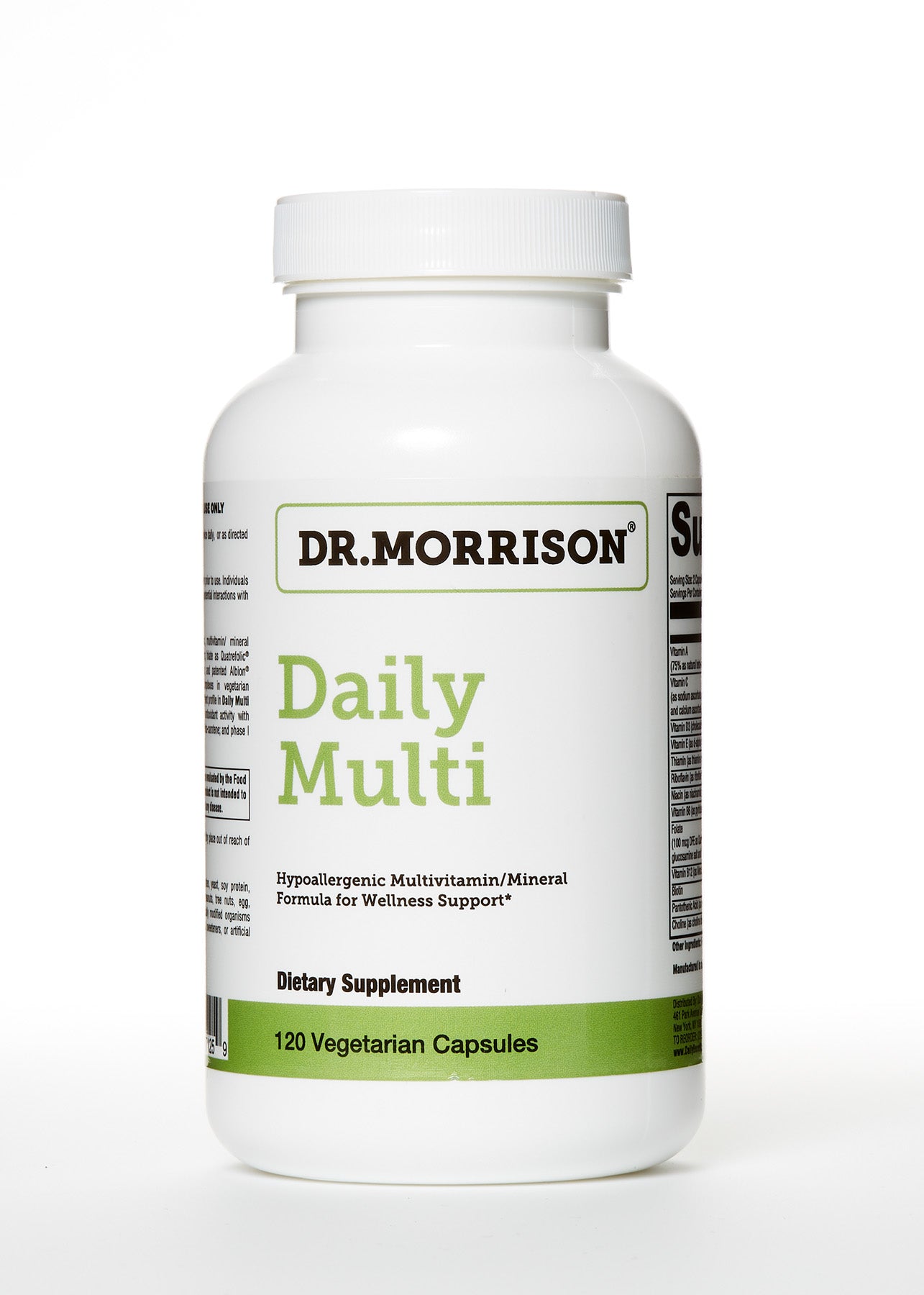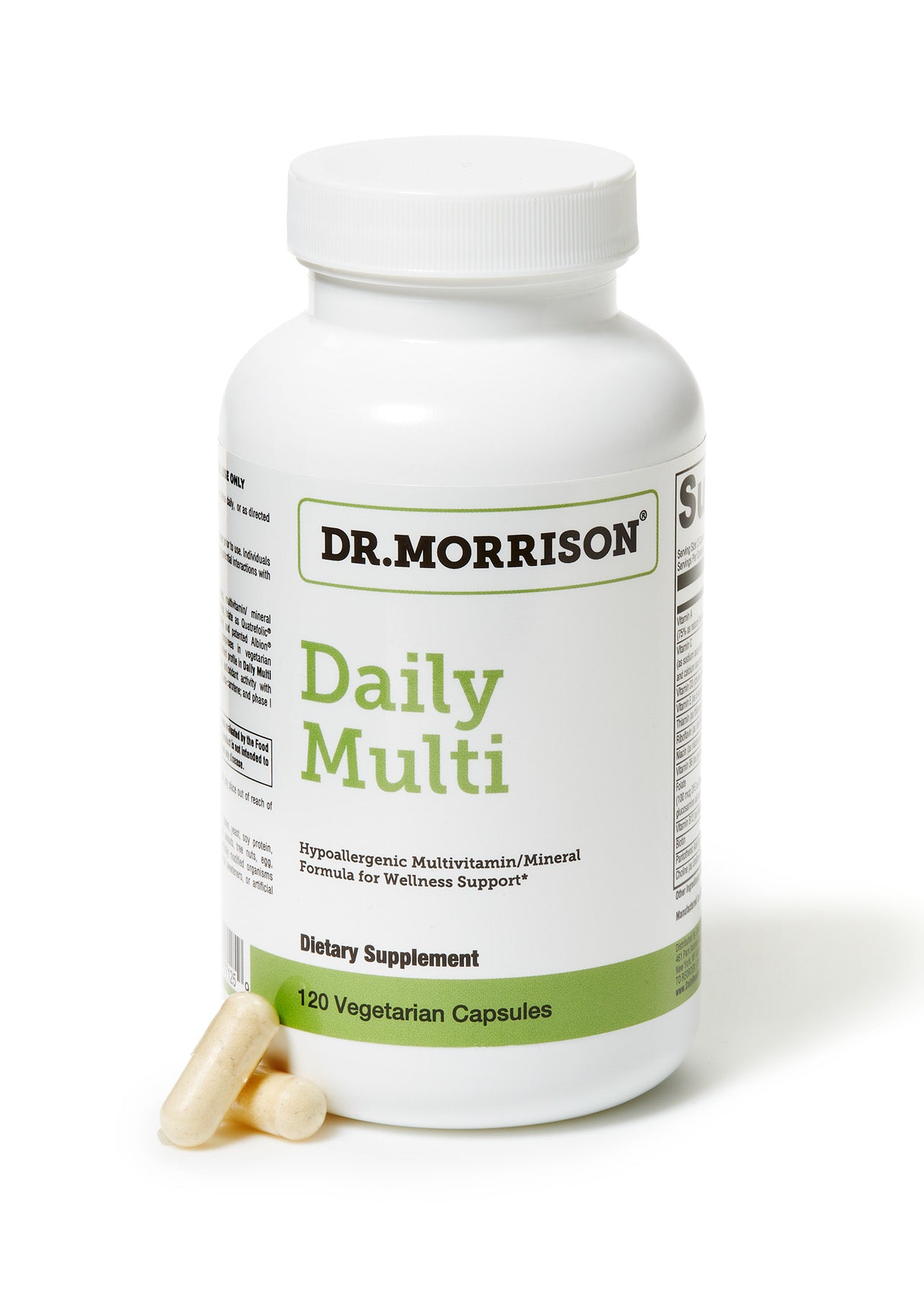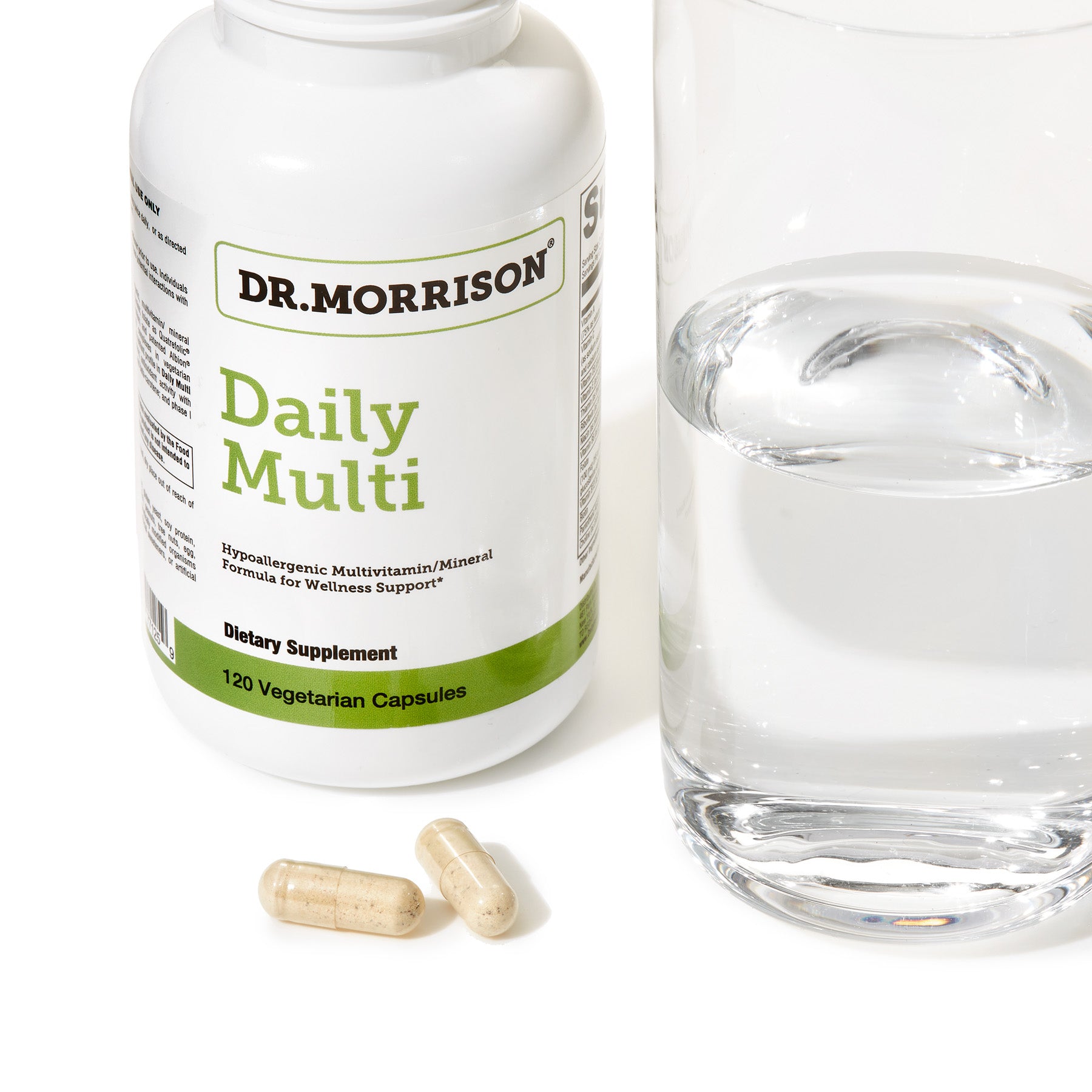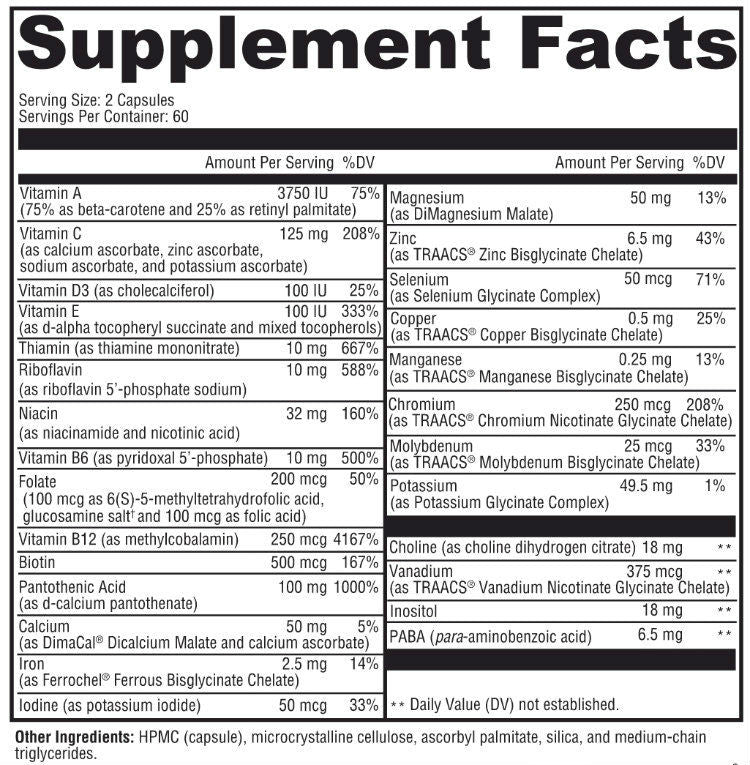Daily Multi
$ 44.00
Size: 120 Vegetarian Capsules
Comprehensive Daily Vitamin and Mineral Formula for Optimal Nutrition and Energy*
Please select all options.
Daily Multi features a premium, multivitamin/mineral blend of high-quality nutrient forms selected for optimum utilization. This comprehensive hypoallergenic nutrient profile is delivered in a vegetarian capsule and supports foundational wellness, antioxidant activity, and healthy detoxification.
Product Highlights:
- Foundational Nutrition Formula for Wellness*
- Supports Antioxidant Activity with Vitamins A, C, and E, and Selenium*
- Nourishes and Cleanses the Liver with Strategic Nutrients*
- Supports Health in Individuals with Inadequate Nutrient Status*
- Supports Maximum Energy Production with Active B Vitamins*
- Promotes a Healthy Stress Response*
While deficiency diseases like scurvy are rare in the developed world, research shows that nutrient inadequacies are all too common.1 Many people do not consume enough essential vitamins and minerals every day, which may contribute to degenerative diseases and chronic illness.2 Even if you do your best to eat a diverse helping of fruits and vegetables, modern agricultural practices have depleted nutrients from our soil, which means less essential nutrients in our food.3 Taking a multivitamin/mineral like Dr. Morrison’s Daily Multi can be a powerful way to help protect your overall health.*[4]
*These statements have not been evaluated by the FDA and are not intended to treat or cure any disease.
We love Daily Multi as a natural, daily insurance plan for nutritional health. No matter where life takes you, you’ll always get the vitamins and minerals you need from Daily Multi.
Daily Multi contains a full spectrum of vital nutrients in balanced proportions, to provide complete nutrition while reducing the risk of nutrient toxicity that can be associated with some formulas.
This product is…
- Completely vegan and gluten-free
- Hypoallergenic
- 100% free from artificial sweeteners, colors, and preservatives
2 CAPSULES PER SERVING
Vitamin A (75% as natural beta-carotene and 25% as retinyl palmitate) 1,120 mcg Vitamin C (as sodium ascorbate, potassium ascorbate, zinc ascorbate, and calcium ascorbate) 125 mg Vitamin D3 (cholecalciferol) 2.5 mcg (100 IU) Vitamin E (as d-alpha tocopheryl succinate) 67 mg Thiamin (as thiamine mononitrate) 10 mg Riboflavin (as riboflavin 5’-phosphate sodium) 10 mg Niacin (as niacinamide and niacin) 32 mg Vitamin B6 (as pyridoxal 5’-phosphate) 10 mg Folate (as (6S)-5-methyltetrahydrofolic acid, glucosamine salt)S1 340 mcg DFE Vitamin B12 (as methylcobalamin) 250 mcg Biotin 500 mcg Pantothenic Acid (as d-calcium pantothenate) 100 mg Choline (as choline dihydrogen citrate) 18 mg Calcium (as di-calcium malateS2, d-calcium pantothenate, and calcium ascorbate) 50 mg Iron (as ferrous bisglycinate chelate)S2 2.5 mg Iodine (as potassium iodide) 50 mcg Magnesium (as di-magnesium malate)S2 50 mg Zinc (as zinc bisglycinate chelate)S2 6.5 mg Selenium (as selenium glycinate complex)S2 50 mcg Copper (as copper bisglycinate chelate)S2 0.5 mg Manganese (as manganese bisglycinate chelate)S2 0.25 mg Chromium (as chromium nicotinate glycinate chelate)S2 250 mcg Molybdenum (as molybdenum glycinate chelate)S2 25 mcg Potassium (as potassium glycinate complexS2 and potassium ascorbate) 49.5 mg Inositol 18 mg PABA (para-aminobenzoic acid) 6 mg Vanadium (as vanadium nicotinate glycinate chelate)S2 375 mcg
Other Ingredients: Capsule (hypromellose and water), microcrystalline cellulose, ascorbyl palmitate, silica, medium-chain triglyceride oil, and mixed tocopherols
FORMULATED TO EXCLUDE: Wheat, gluten, yeast, soy, dairy products, fish, shellfish, peanuts, tree nuts, egg, GMOs, artificial colors, artificial sweeteners, and artificial preservatives.
Take two capsules twice daily, or as directed by your healthcare practitioner.
Warning: Accidental overdose of iron-containing products is a leading cause of fatal poisoning in children under 6. In case of accidental overdose, call a doctor or poison control center immediately.
Inadequate dietary intakes of vitamins and minerals are widespread, most likely due to excessive consumption of energy-rich, micronutrient-poor, refined food. Inadequate intakes may result in chronic metabolic disruption, including mitochondrial decay. Deficiencies in many micronutrients cause DNA damage, such as chromosome breaks, in cultured human cells or in vivo. Some of these deficiencies also cause mitochondrial decay with oxidant leakage and cellular aging and are associated with late onset diseases such as cancer. I propose DNA damage and late onset disease are consequences of a triage allocation response to micronutrient scarcity. Episodic shortages of micronutrients were common during evolution. Natural selection favors short-term survival at the expense of long-term health. I hypothesize that short-term survival was achieved by allocating scarce micronutrients by triage, in part through an adjustment of the binding affinity of proteins for required micronutrients. If this hypothesis is correct, micronutrient deficiencies that trigger the triage response would accelerate cancer, aging, and neural decay but would leave critical metabolic functions, such as ATP production, intact. Evidence that micronutrient malnutrition increases late onset diseases, such as cancer, is discussed. A multivitamin-mineral supplement is one low-cost way to ensure intake of the Recommended Dietary Allowance of micronutrients throughout life.
We reviewed recent scientific evidence regarding the effects of multivitamin/mineral (MVM) supplements on risk of chronic diseases, including cancer, cardiovascular disease, and age-related eye diseases. Data from randomized controlled trials (RCTs) and observational, prospective cohort studies were examined. The majority of scientific studies investigating the use of MVM supplements in chronic disease risk reduction reported no significant effect. However, the largest and longest RCT of MVM supplements conducted to date, the Physicians' Health Study II (PHS II), found a modest and significant reduction in total and epithelial cancer incidence in male physicians, consistent with the Supplémentation en Vitamines et Minéraux Antioxydants (SU.VI.MAX) trial. In addition, PHS II found a modest and significant reduction in the incidence of nuclear cataract, in agreement with several other RCTs and observational, prospective cohort studies. The effects of MVM use on other subtypes of cataract and age-related macular degeneration remain unclear. Neither RCTs nor prospective cohort studies are without their limitations. The placebo-controlled trial design of RCTs may be inadequate for nutrient interventions, and residual confounding, measurement error, and the possibility of reverse causality are inherent to any observational study. National surveys show that micronutrient inadequacies are widespread in the US and that dietary supplements, of which MVMs are the most common type, help fulfill micronutrient requirements in adults and children.





